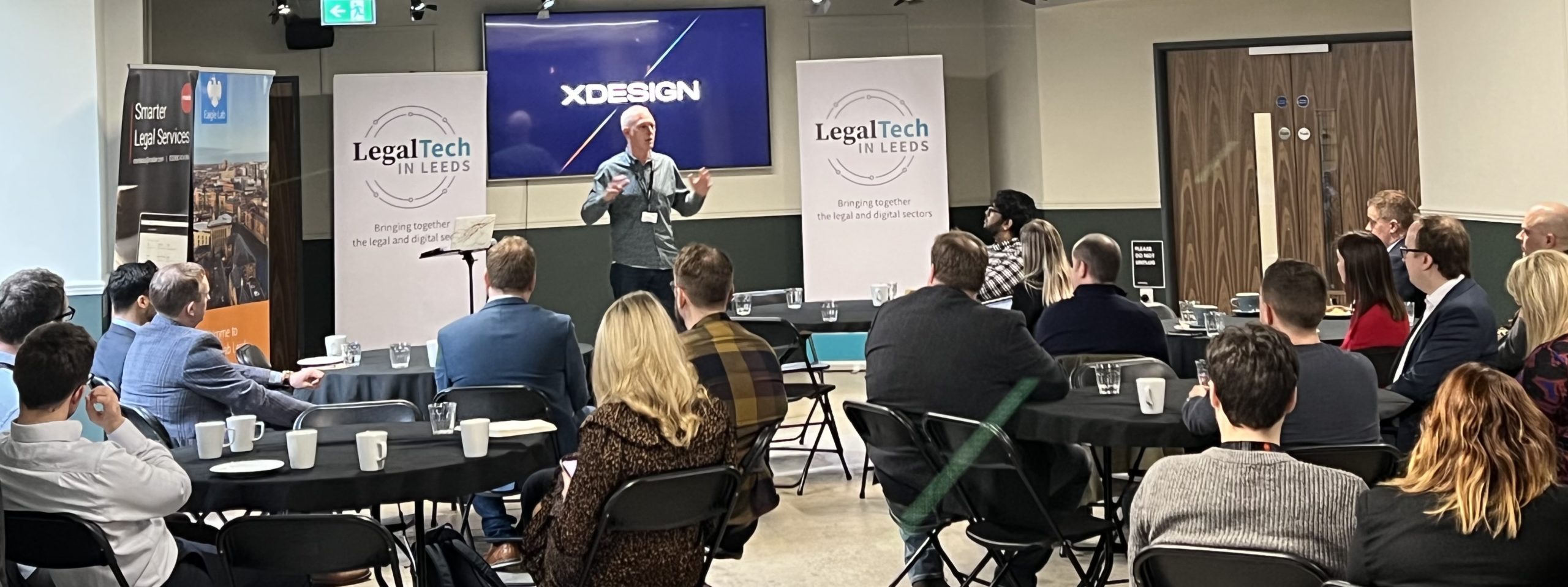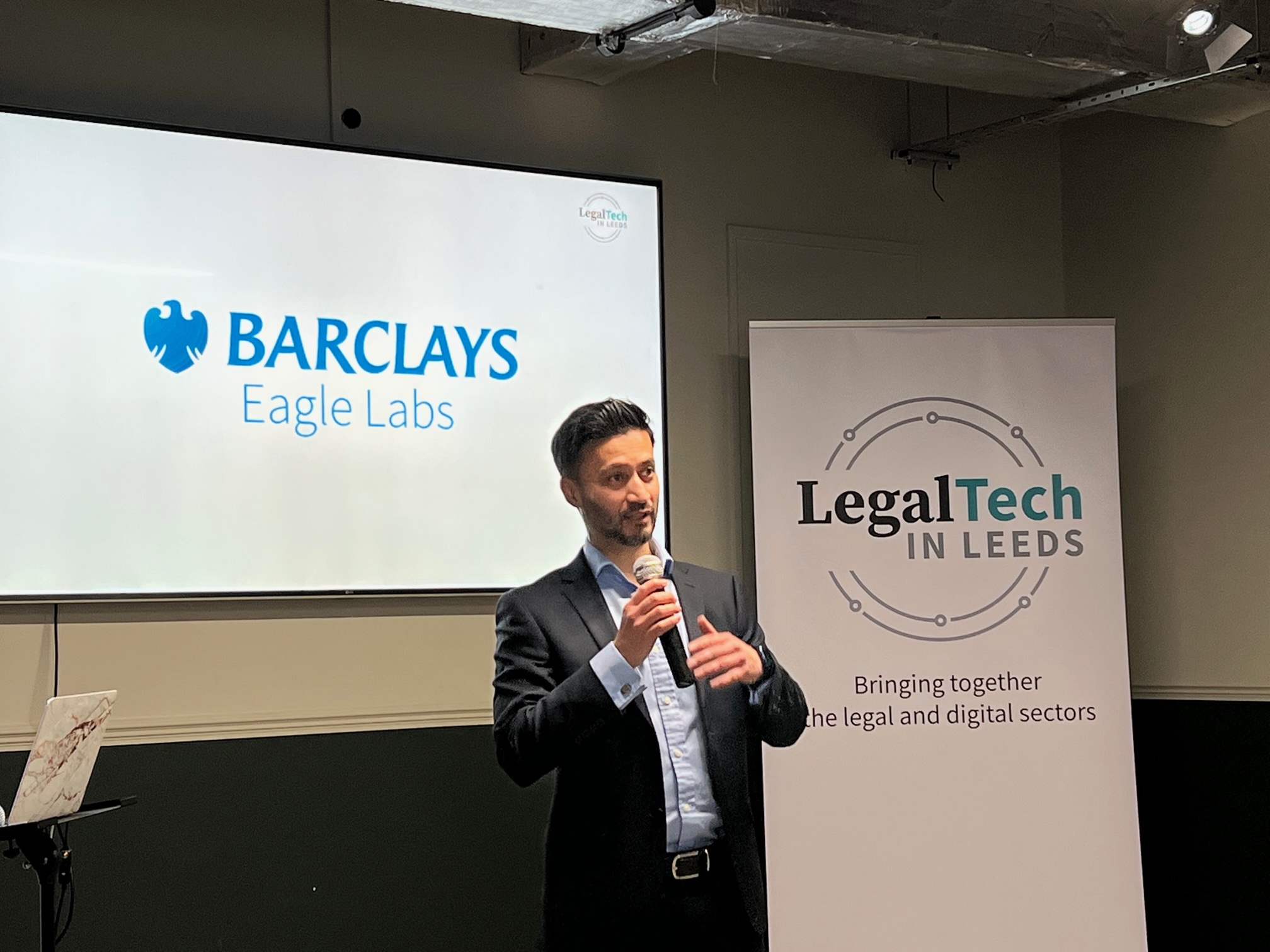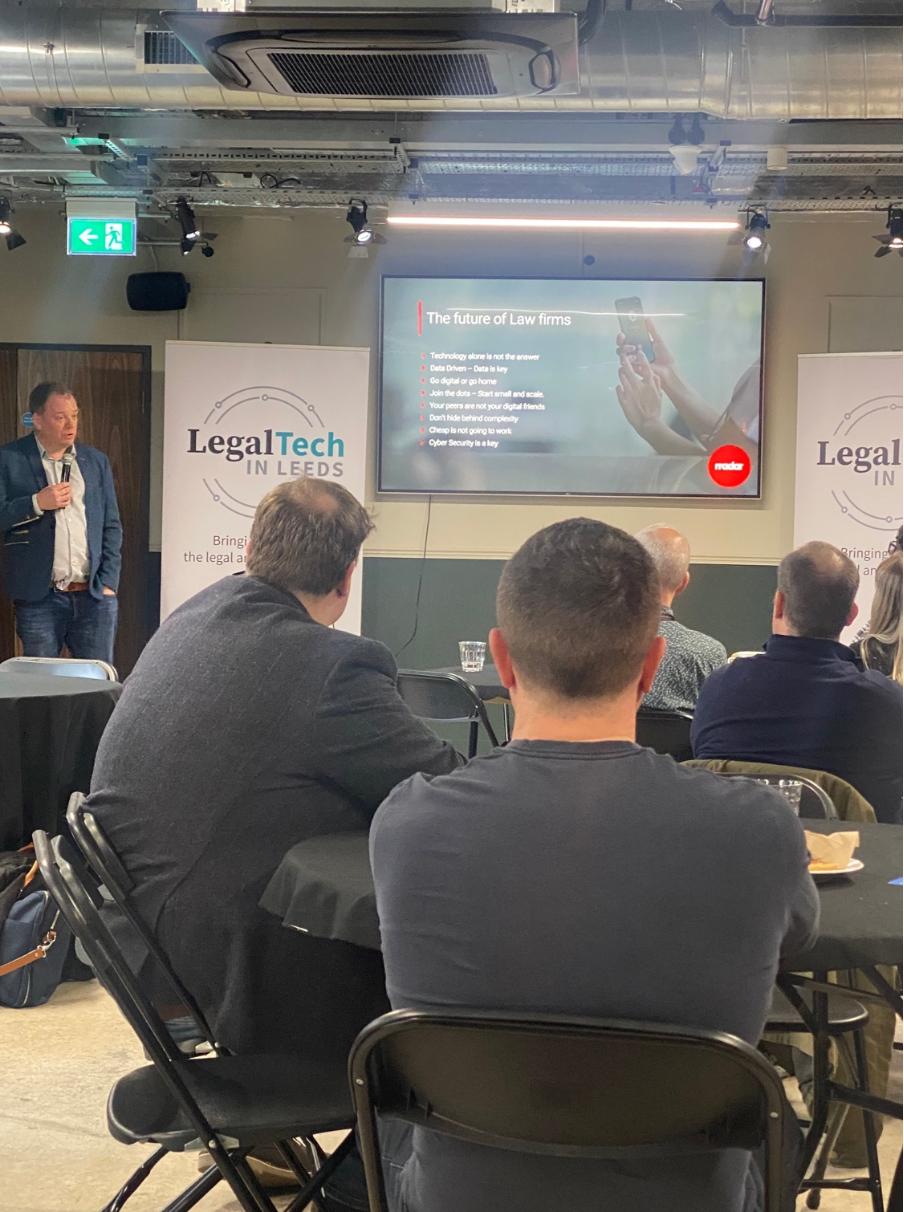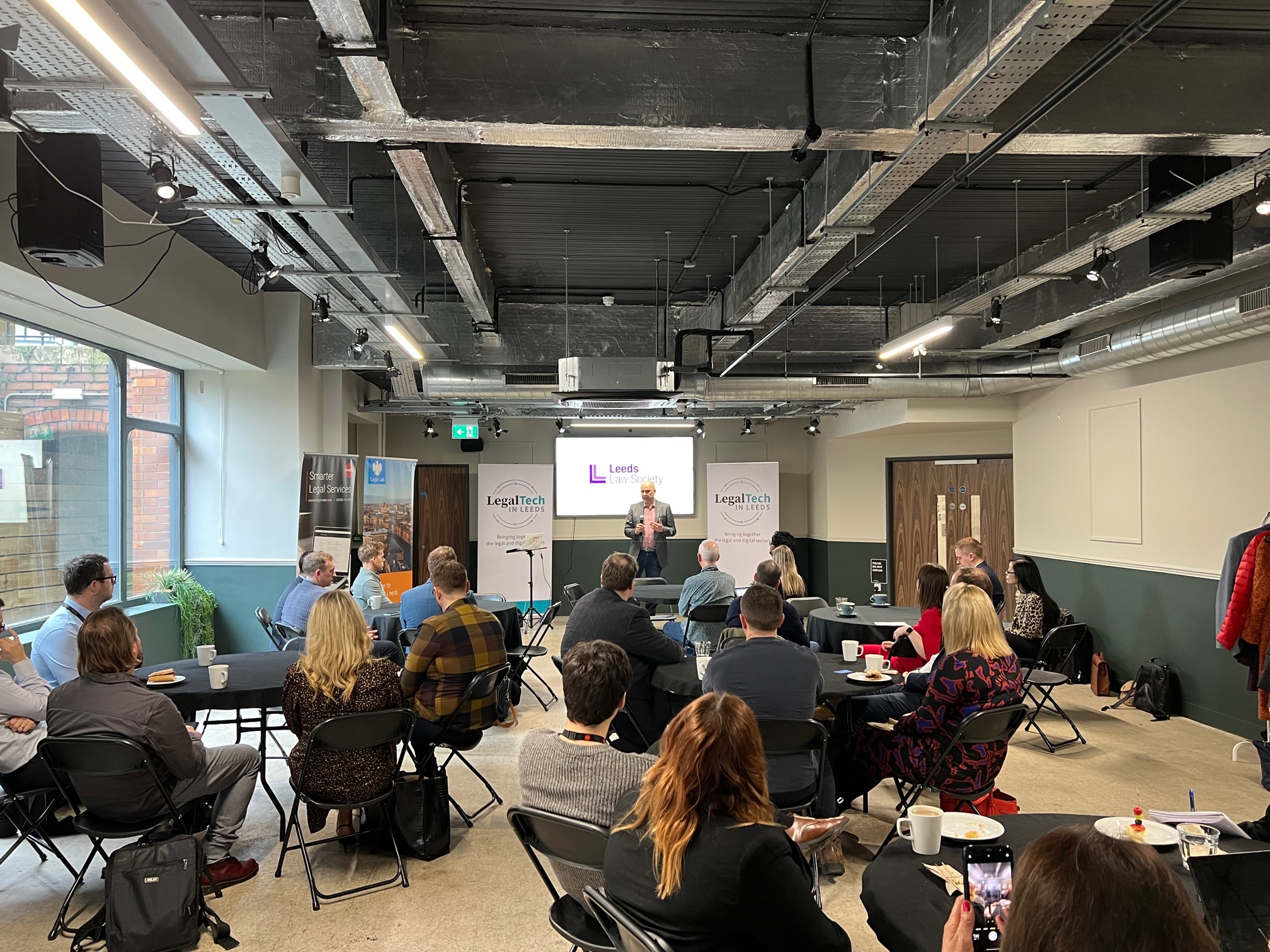
The LegalTech in Leeds initiative aims to bring together the legal and digital sectors via a series of event-based initiatives, and is being made possible by the support of Bruntwood SciTech, Barclays, DAC Beachcroft, Leeds City Council, Leeds Law Society, rradar, Pinsent Masons, Salesforce, Toca.io and University of Law.
We would like to say a big thank-you to our speakers and those who attended the event. For those who could not attend, we have produced this brief write-up of the event.
We kicked off proceedings with introductions from Julian Wells, Director of Whitecap Consulting, who outlined the concept and key objectives of the LegalTech in Leeds initiative.
Chris Winn, Ecosystem Manager at Barclays Eagle Labs then spoke about how Barclays is encouraging collaboration and helping entrepreneurs grow their businesses through a network of co-working spaces, mentors and learning tools which is helping the UK’s startup community scale and succeed.
We also had Owais Mohammad, Relationship Director of Professional & Financial Services at Barclays expressing how the corporate bank is interested in adding value to the legal services sector by acting as a facilitator to bringing together law firms and entrepreneurs in order to inspire innovation in the sector, a goal that is extremely well aligned to the LegalTech in Leeds initiative. In partnership with The Law Society, Barclays Eagle Labs created a LawTech Centre of Excellence.

Tom Matusiak, a Director at Leeds Law Society and Legal Director at the law firm Stewarts, highlighted the strong heritage of the legal sector in Leeds along with the quality of its legal services through a speech in which he stated:
“The LegalTech in Leeds events are designed to build collaboration between the legal and tech sectors. We want the events to find solutions for genuine challenges, build genuine connections, and give professionals, firms, start-ups, and graduates even more reasons to choose Leeds and develop in Leeds.”
Tom highlighted how evolving technologies are leading to a critical juncture for the legal services industry and expressed the need to build the necessary collaboration that will allow the legal sector to address its current challenges, finishing with the quote that a leading legal publication used in relation to Leeds: “The future is Northern.”

Next, we had a joint presentation from David Williams and Susan Ford of DAC Beachcroft.
David is a Partner at the firm, and spoke about the award-winning client care package that the firm has recently introduced and seen huge amounts of success from. The care package was designed as a direct result from client feedback as it had been brought to the attention of the law firm that some clients may benefit from more information more frequently along the claim handling journey.
In order to deliver this efficiently, the innovation lab at DAC Beachcroft created a series of bitesize “explainer videos” for clients which provided reassurance along the claims journey and led to a reduced number of clients needing to ring to ask questions/ request updates. David also highlighted a number of other examples of how the firm is digitising such as through the introduction of e-sign and the use of SMS to communicate with clients.

Susan, who is Head of Knowledge, explained DAC Beachcroft’s “problem first” approach to innovation. Susan used the example of the introduction of the ideation platform which encourages employees to post challenges/ problems to the platform as well as potential ideas/ solutions.
The ideas go through a process of validation where employees vote on them and challenge them to determine whether it has the potential to become a working project. The platform is accessible to all employees across all functions within DAC in order to gain input from differing perspectives.
Up next, we had Paul Ryan, Director at Focis, who shared his perspective on the challenges that many tech companies face when targeting the legal sector. Paul, who had travelled from Scotland to speak at the event, highlighted that law firms already automate most of their internal processes and have successfully been doing this for many years.
However, the challenge for tech firms is the lack of standardisation across the sector which leads to a lot of rewriting and repetition and adds huge amounts of unnecessary complexity when trying to integrate into a law firm’s existing system. Paul stated that going forward, there is a real need for the legal sector to standardise and focus on workflow technology being the foundation upon which firms can individually build and add layers to.


After a short networking break, we then hear from Andy Clarke, Chief Technology Officer at rradar, who stated:
“Technology in isolation cannot solve the problems associated with successfully implementing LegalTech, a business also needs to have the right foundations in place with regards to things like culture, processes, governance and cybersecurity.”
Andy talked about the importance of putting your customer at the centre of decision making and highlighted the current mismatch between customer expectation and the current customer journey associated with traditional law firms. He also added that it is important to realise your peers are not your digital friends, and you shouldn’t hide behind complexity.
Andy discussed how most clients do not have a predetermined expectation of an engagement with a law firm and so they usually base it on their previous experiences such as dealing with companies like Amazon. Therefore, when a traditional law firm wants to meet clients in-person or speak with them via telephone, it is often met with some resistance. He stated that disruptors on the other hand are designed purely based on how the customer wants to engage with them and so are often seen as easier to do business with. Andy concluded his talk with the quote “build solutions that are going to fix the problem of tomorrow, not just the problem of today”.

Keith Sutton, Business Development Director at Toca then talked about the challenge faced by many law firms with regards to the reluctance to invest large amounts of money into a technology solution in case there is no return on investment, a challenge particularly relevant for smaller law firms who have limited resource. As well as this, the cost of hiring developers is continuously increasing which acts as a further barrier for law firms when it comes to adopting and implementing new tech.
Toca allows firms to transform the way they work, connecting legacy systems, centralising data and documentation, automating processes, and building secure client portals. With a successful track record in the NHS, Toca has now been approached by the legal sector to streamline workflows, increase efficiency and reduce operational costs through a “wraparound system” which allows firms to build upon and develop, rather than requiring the risk of replacing existing systems. Based in Reading, the team at Toca have been regular visitors to Leeds over recent months and are involved in No Code Lab, who will be speaking at the conference next week.
The led to a discussion amongst the audience and Emma Pearmaine, Managing Director at Ridley & Hall Solicitors shared her thoughts on the challenges around innovation that smaller law firms like Ridley Hall face. Emma explained how Ridley Hall has remained committed to access to justice despite a lack of resources putting pressure on the firm to drop their legal aid work in pursuit of more profitable areas. Emma stated that Ridley & Hall Solicitors will continue to improve the lives of the local community through providing access to justice but that investments in tech will be necessary going forward to ensure the firm can compete in years to come.

Our last speaker was Matt Ward, Head of Leeds at xDesign, who spoke about technology solutions through an engineering lens explaining that the approach is to understand as much as possible about the challenge at hand with the aim of extracting as much value as possible in the quickest time. Matt stated that introducing an engineering perspective into the early stages of design means that solutions have the essence of agile thinking but are moulded to what that particular business is capable of.
Matt finished his talk by stating xDesign embraces disruptive digital innovation in the complex, regulated environment that is the legal sector and although not all law firms will have the in-house tech capability, the aim of xDesign is to support firms from idea to implementation and beyond.
Overall, it was great to hear some of the disruptive thinking within the legal and tech sector as well as providing a fantastic opportunity for thought provoking discussions and relationship building between the sectors. You can see the write-up of our first drop-in session here.
With just over a week to go, we now look forward to the LegalTech in Leeds Conference 2022! The published agenda for this event can be viewed here.
Please register for the conference using the link below.
LegalTech in Leeds Conference 2022 – 24th March @ West Gate:
https://www.eventbrite.co.uk/e/legaltech-in-leeds-conference-2022-tickets-247282848657